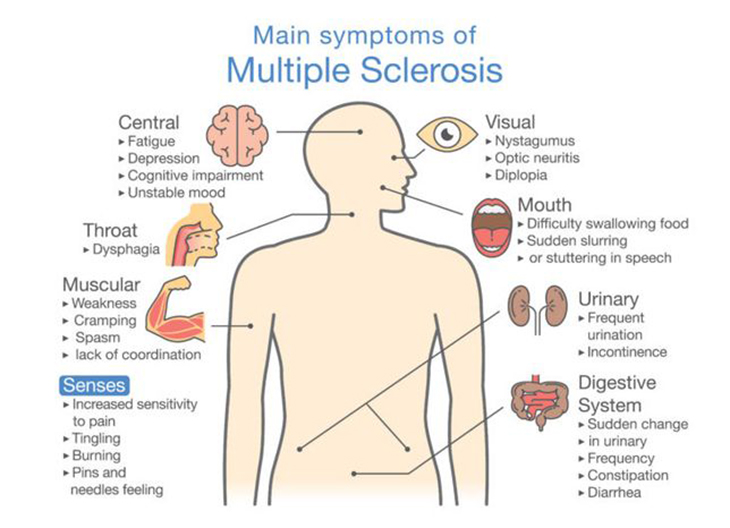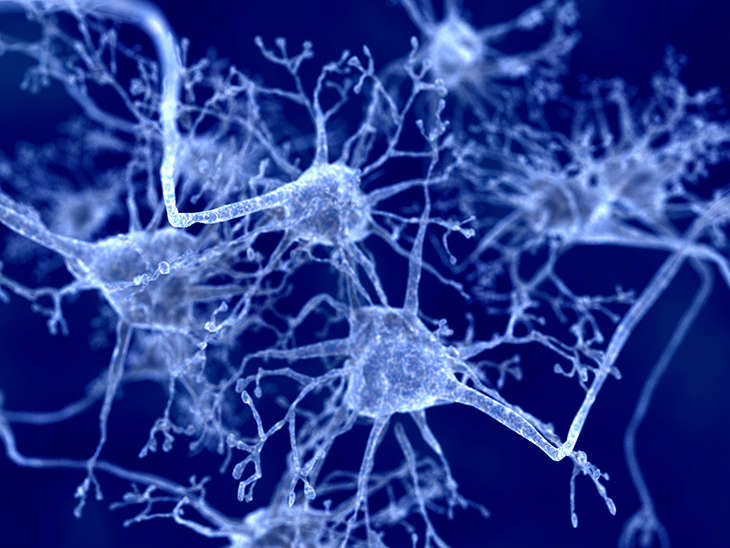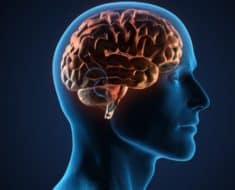
Philly Voice
Multiple Sclerosis is a disease that affects the central nervous system (CNS), disrupting the flow of information in the brain, as well as between the brain and body. According to the National Multiple Sclerosis Society, almost 1 million adults have been diagnosed and are living with MS within the United States.
The central nervous system is made up of the brain, spinal cord, and optic nerves, which is also why having MS can affect balance, memory, hearing, speech, and mobility. MS tends to affect people between the ages of 15 to 40, with women being three times as likely to get MS than men.
Moreover, the specific cause of MS still remains unknown, yet what is known is that it’s triggered by the immune system attacking the brain and spinal cord. As a result, there is damage to the myelin, the substance that works as a protective layer, or the ‘wire-like nerve fibers’ in the CNS. When the fibers are attacked, they create communication issues between the signals that come from the brain. Unfortunately, MS also happens to be a chronic disease that has no cure, but getting an early diagnosis can help counter damage.
The following are 14 common signs and symptoms linked with MS.
1. Numbness and Tingling
MS is known to strike the nerves in the brain and spinal cord first, and when something affects the spinal cord, it normally causes issues in other areas of the body. The spinal cord is the body’s known “message center,” and when it stops receiving signals from the brain, this is normally when patients begin to feel tingling, numbing, or even burning sensations. Patients tend to complain about feeling it around the face, arms, legs, and upper extremities. WebMD even describes the sensation as “electrical shock-like feeling when you move your head or neck. It may travel down your spine or into your arms or legs.” Although not all patients experience the same feelings, it is one of the earliest and most common since it can happen at any stage of the disease.

Medical News Today
2. Vision Issues
Another common symptom of MS is having vision issues or blurred vision. This is because the disease tends to cause inflammation within the optic nerve, which is a condition called optic neuritis. Others share that the manifestation of their vision issues are either blurred vision, or a loss of vision, or double vision, which is something that is referred to as “dancing eyes.” In some cases, there is pain when looking side to side. Notably, only one eye is affected and not both. Although thankfully, vision loss isn’t permanent and usually comes back. According to Healthline, more often than not, these vision issues don’t always happen right away, instead they tend to occur slowly as time passes.
Another condition that deals with vision issues is called clinically isolated syndrome, or CIS. This is when there are neurological symptoms that last for no less than 24 hours and are not linked to any other cause. At times, CIS is a results of optic neuritis, Lhermitte’s sign, or Transverse myelitis. Although if someone is diagnosed with CIS it doesn’t mean that they automatically have MS, but there are times that it is considered an early symptom of this chronic disease.

This Quarterly
3. Cognitive Function Decrease
Around 50 percent of patients diagnosed with MS have a decrease in cognitive function, or cognitive impairment. This means that they suffer from such health problems like memory loss, inability to focus, disorganization, difficulty finding the right words, difficulty processing information, and majorly reduced attention spans. According to WebMD, this is when “It might be hard to focus from time to time. This will probably mean slowed thinking, poor attention, or fuzzy memory. Some people have severe problems that make it hard to do daily tasks, but that’s rare.” Despite these symptoms not necessarily being unique to MS, they still tend to be common amongst MS patients.

Everyday Power
4. Dizziness, Balance and Coordination Issues
Another common sign of MS is issues with dizziness, coordination and balance. Patients tend to feel lightheaded or nauseated, often like how people with vertigo feel when they stand up too quickly. On Healthline, they explain that a doctor may refer to this as an issues “with your gait,” which is someone’s ability to walk or create a feeling of losing one’s balance. Although it may seem similar to vertigo, which is actually an inner ear problem, when it comes to MS, it is actually referred to as central vertigo because it’s due to the lesions that occur around the brainstem, interrupting the normal pathways of the brain signals to other parts of the body.

Medical News Today
5. Muscle Spasms
More often than not, MS causes chronic pain that tends to begin the leg and back muscles, creating the joints to stiffen. In fact, back pain is the most common type of pain that MS patients actually complain about. When this occurs, people usually have involuntary muscle spasms, which cause jerking motions, often leading to embarrassment. On the National MS Society website, it explains that almost half of the patients with MS not only experience chronic pain, but also “Muscle stiffness or spasms (spasticity) are also common. You might experience stiff muscles or joints as well as uncontrollable, painful jerking movements of the extremities.”

Onewelbeck
6. Bladder Issues
Bladder issues or dysfunction is often described as a number of things such as having to urinate frequently, the inability to urinate, the inability to hold urine, the strong urge to urinate, and even insomnia due to the constant loss of urinary control. Many times, these issues occur due to the lesions that affect the brain and spinal cord, leaving the bladder unable to function the way it’s supposed to because the of the interference of the signal transmissions between the brain and bladder. These can even lead to very embarrassing issues for patients when public accidents occur.

Crestview Gynecology
7. Weakness and Fatigue
Most patients that have MS normally complain of major weakness and the sudden onset of fatigue, more so in their lower extremities. This tends to leave them feeling very drained and exhausted, lacking any energy for anything. And as the disease progresses, and the nerves deteriorate even more, the exhaustion gets even worse. Fatigue affects around 80 percent of MS patients, especially in the early stages, which is why it is considered one of the more common early signs of the disease. Healthline shares, “Chronic fatigue occurs when nerves deteriorate in the spinal column. Usually, the fatigue appears suddenly and lasts for weeks before improving. The weakness is most noticeable in the legs at first.”
In a number of cases, patients also complain that fatigue is worse in the afternoons, which ends up affecting their mental state as well. Even worse, this weakness can even cause the muscles to atrophy, meaning they shrink from the lack of use.

Great People Inside
8. Depression
People with MS normally go through major depression, mostly because it’s a chronic and life-long disease. One particular condition that’s caused by stress from MS is called pseudobulbar effect, which causes irritability and mood swings. In fact, this condition occurs in 1 out of 10 patients. Patients tend to go through sudden bouts of uncontrollable crying and laughing at the same time, even without a trigger. This can also be an effect of patients having a difficult time accepting their diagnosis and a fear of the unknown. Moreover, experts share that MS has the ability to “affect your emotions.”

Elite 24er
9. Sexual Dysfunction
Sexual dysfunction tends to be a problem for patients with MS, men particularly. Patients complain of the lack or complete loss of sexual arousal. Since sexual stimulation originates in the CNS, this is one common sign since MS affects the nerve pathways which are in direct relation to normal healthy function. This is also why women complain about vaginal dryness. WebMD shares that both sexes may also “be less responsive to touch, have a lower sex drive, or have trouble reaching organism.” Because of this, patients with MS also go through emotional issues because of this as well.

Active Beat
10. Speech Problems
Although MS doesn’t necessarily affect one’s ability to read or understand speech or conversation, it can affect focus and one’s ability to process information. This may mean that you will have problems responding as fast as you once did, or you may even take long pauses in between words when you are speaking. This can cause nasal or slurred sounding speech. For some patients, this may even lead to a difficulty with swallowing as the disease progresses, but that’s not always the case.

Flint Rehab
11. Heart-Related Health Conditions
Another early warning sign of MS is having heart-related health problems. For example, someone that usually exercises on a regular basis may find themselves getting winded very quickly. Or for others, they can’t seem to do the usual physical activities that they once did with ease. These heart issues have the ability to cause weakness and fatigue, making it harder to control certain body parts too, like the foot or leg.

CDC
12. Strange or Unusual Sensations
People with MS tend to go through numbness and muscle spasms, but they can also experience other strange or unusual sensations like “itching, burning, stabbing, or tearing pains.” According to the Multiple Sclerosis Society of Canada, they explain that the most common sensation is numbness, but these other sensations may occur as well. Normally, they’re felt in one limb, then gradually spread out to other parts of the body while increasing in intensity as well. One particular sensation is called the “MS hug,” which is when patients feel a tightening around their upper belly and ribs, which is called dysesthesia by experts.

Multiple Sclerosis News Today
13. Tremors
Another symptom that’s often felt by at least half of MS patients is tremors. Tremors can be described as minor shakes, but they can become so intense that they can create problems trying to finishing simple, everyday tasks. Although there are no specific medications to treat just the tremors, there are some medications that can help curb them.

Healthline
14. Bowel Dysfunction
Just like with bladder issues, MS can also cause bowel dysfunction because of the lesions that cause issues between the brain and the transmission of signals in other parts of the body. One characteristic of bowel dysfunction is constipation, while others have incontinence and diarrhea. This is yet another symptom that can be incredibly embarrassing for patients who cannot control their bowels.

Grace Pelvic Health









































